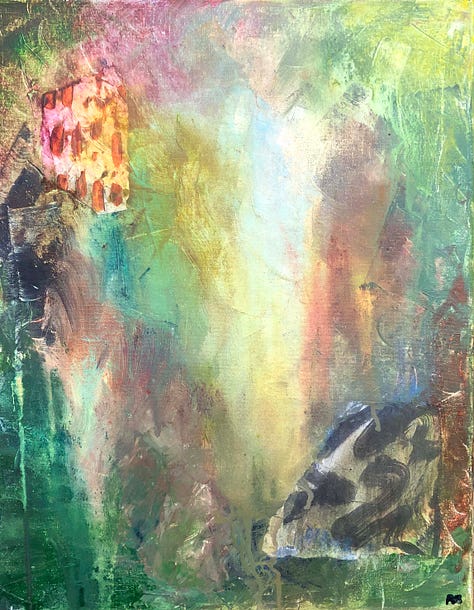Chapter 28: Paradoxes
It’s all so tragic, how two people can be growing and learning individually, and at the same time falling apart from each other.
Ecclesiastes:
1:13 And I gave my heart to seek and search out by wisdom concerning all things that are done under heaven.
2:16 I communed with mine own heart.
4:1 I considered all the oppressions that are done under the sun: and behold the tears of such as were oppressed, and they had no comforter; and on the side of their oppressors there was power; but they had no comforter.
8:1 …wisdom maketh [her] face to shine, and the boldness of [her] face shall be changed.
(TW: mention of suicide ideation later in this chapter)
In August I attended a weekly online women’s group about joy. I learned so much from these women. I think I was trying to find my own empowerment, my own joy, even in the midst of my spiritual and marital turmoil. Some kind of growth was happening there. Like me trying to understand my true self and create the kind of life I wanted, to fully feel my humanness. To keep intentionally experiencing moments of joy in our family.
One of the main messages from our group facilitator was that we can actively set our own intentions for joy, in whatever way that looks for us.
“How do you let go of the only form of self you’ve ever known?
How do you change from a person of constant nervous energy or someone checked out with no real presence to someone who makes joy her first priority in life?
YOU SET AN INTENTION FOR JOY.
But it’s hard work. “
In one session, our facilitator said, “If you’ve noticed that doing this joy work has made it hard for you at times, know you’re not alone.”
“You see, you’re changing your mind. And even though that change will be much better for your spirit and mood later, right now it might feel awkward as hell and uncomfortable too.”
Then she shared this quote from Brianna West:
Finding yourself is not an immediately beautiful thing. It’s less meeting your soul at the mountaintop and more sorting through the debris that prevents you from seeing the path. It's less falling into peacefulness and more confronting the inner voices that stir up self-loathing. It’s less revelations, and more honestly allowing the heaviest thoughts to simply pass without taking action that disrupts your day. I know it is counterintuitive, but finding yourself is one of the hardest things you will ever do –and it is also the most life-giving. There is nothing else that will bring you back home to yourself.
I was sorting through my debris.
Josh had also started on his own journey of self-understanding. He began learning more about complex PTSD from his childhood trauma, in hopes that he could heal from all he endured as a child and young man.
He started reading books and articles about attachment bonds, trauma, C-PTSD and healing, at a feverish pace. He shared a lot of quotes and chapters with me, which were helpful and enlightening, but I struggled to keep up with all the information he was sharing with me. It was so much to process.
We talked often about what we were learning and feeling and experiencing in our own individual growth paths. Josh was proud of me for tackling my huge emotions. I was so proud of him for working through his issues. We both felt that our breakthrough into healing from our childhood trauma was one of the most meaningful developments in our marriage. We were entering a new phase of life, where we were true to ourselves, to each other and to our needs.
Unfortunately, as Josh and I were doing our individual work, things started getting more strained between us. We were processing so much. We were trying to keep the parts of our relationship that were good, and change the things that were unhealthy. We got caught in a cycle of hurting each other, forgiving, then hurting again. We were trying so hard.
Josh said he would never give up on me.
I knew I would not give up on him. I thought we were experiencing growing pains and I believed we would get through it.
What I didn’t realize then was that our marriage was unraveling.
How is it that there can be so much personal growth and enlightenment, and at the same time our marriage started to crumble? When both people in a marriage are growing, changing and healing, is it inevitable that that the relationship will deteriorate? Or is it possible that they can grow and change and adapt to the new version of themselves?
It’s all so tragic, how two people can be growing and learning individually, and at the same time falling apart from each other.
At the same time we were working on communication in our marriage, we were hurting each other
At the same time I was so proud of Josh, I was becoming more stressed around him
I was working so hard to support my husband, just as I was losing my husband
I was guiding and nurturing my children but struggling to stay present with them.
I was working so hard on understanding myself, but still hiding parts of me
The paradoxes. So bewildering.
I was also facing paradoxes in my faith and relationship with the church.
Praying so hard and turning to God — as my perception of God was changing
Studying scriptures for answers — I became more confused
Hanging on to the church — finding it difficult to be there
Filled with wonder — filled with despair and fear
My soul was expanding — losing my faith
I was being hurt by the same church that had blessed me so much.
As I continued with my spiritual upheaval, anytime something about the church came up and I was aggravated, I had a habit of bringing it up with Josh. But because he was trying to emotionally distance himself from the church, me bringing up church issues all the time really triggered him. We tried to set boundaries about what we could talk about with each other. I would ask Josh if he had the capacity at that moment to talk about it. Sometimes he did, but sometimes he didn’t and I tried to respect that. But I often failed. At one point we tried to make any church topic off limits.
Feeling so alone in my spiritual struggles, I was absolutely relieved when I found a podcast and community of like-minded Mormon women, called At Last She Said It. 1 The hosts, Cynthia Winward and Susan Hinckley talk about all the hard topics. The worries. The disenchantment with the church. The hurt. And how to navigate that personal path, whether it be in the church or leaving or anywhere in between.
I surely needed that because I lost my marbles when I heard about Elder Holland’s “musket talk” that he gave at BYU on August 23rd.
One of his main points was that BYU faculty and staff should take up their intellectual “muskets” to defend the church’s doctrine of marriage as the union of a man and a woman,” even if it means there is “friendly fire.”
Now, I know Elder Holland is a good man, a good leader. I think I understand the intent of his message that day. But at that time in August 2021, I was so sensitive about anything church leaders said about same-sex attraction and queer people, that I got mad. That day I went out to my painting station and furiously created this painting: Love or Muskets? I tore up pages of hymns and burnt them along the edges. I placed the hymns about love and mercy on the left side, with hymns about war, battles and power on the right side.
During this time I continued to have unsettling and fearful nightmares. I would wake up emotionally exhausted, confused and scared. All the nightmares had the familiar feeling of fear, dread, worry, about falling off the church path, losing my salvation, feeling responsible for rescuing others, trying to save myself and my family from hell. I often wrote or painted in the middle of the night when I couldn’t sleep.
The art I created during that time reflects my nightmares and inner turmoil, as well as my search for joy.






Looking back, it really pisses me off that the church’s teachings scared me so much that I was having continual distressing nightmares about my eternal salvation. I get that I am a highly sensitive person, but what do you expect when for decades we hear things like:
• “as you choose not to make covenants with God, you are settling for a most meager roof over your head throughout all eternity.”2
• no empty chairs.
• the devil is waiting to sift you as wheat
• if you aren’t perfect, the devil will get you (temple instruction) .
• if you leave the church, you’re ruining my future generations.
• if you don’t proselytize to a random seatmate on the plane, or co-worker, or next-door neighbor, their lack of eternal salvation is on your head.
• Pay a full tithe or be burned in the last days. tithing = fire insurance.
To top it off, a member shared this quote with me, after talking with them about Josh exploring his own path outside the church:3
"Though some of the sheep may wander, the eye of the Shepherd is upon them, and sooner or later they will feel the tentacles of Divine Providence reaching out after them and drawing them back to the fold. Either in this life or the life to come, they will return. They will have to pay their debt to justice; they will suffer for their sins; and may tread a thorny path; but if it leads them at last, like the penitent Prodigal, to a loving and forgiving father’s heart and home, the painful experience will not have been in vain. Pray for your careless and disobedient children; hold on to them with your faith. Hope on, trust on, till you see the salvation of God.”
-Elder Orson F. Whitney, quoted by Elder James E. Faust
They will have to suffer for their sins?!! Pay their debt to justice?!! For following the path that is healthier for them? By just trying to live their life the best they could? I just couldn’t grasp that.
This fear-based teaching is damaging and traumatizing. And I’m going to say it, it is spiritually abusive. I haven’t been able to call things abusive in regards to the church until now, because it is so harsh, because the leaders, teachers and members mean well. But what else is it? Maybe other members aren’t affected by the fear like me and my sensitive heart. I don’t know.
Pete Walker’s wrote this about spiritual abuse: 4
Spiritual abuse typically contains a strong emotional component in which children are filled with “the fear of ‘God.” God is presented to them in terms that are the antithesis of love. They are taught that God will punish them in unimaginably cruel ways if they do not give up (sacrifice) many of their normal and wonderful ways of being.
-Pete Walker
I believed all this. I still believed that if I left the church, even for a few months, I would be putting myself in Satan’s grasp and risking my eternal salvation.
I was tired of feeling ashamed and worried about my faith “crisis.” I was tired of feeling looked down on for being hurt by the church. I had a right to be angry. I am sensitive. I get hurt. God can handle my hurt. I needed to ask Him and Heavenly Mother what I was supposed to do with this pain.
I didn’t want to be chastised, I wanted to be heard.
I was clearly spiritually traumatized at this point. So very weary of my soul’s struggle. I was not in a good place mentally and emotionally. I felt like I was going crazy. My negative thoughts, anxiety, self loathing and suicide ideation increased.
I never thought in a million years that my most difficult spiritual struggles would come from the church.
I never thought in a million years that the church I loved so dearly would become a major wedge between my husband and I.
Seeing my spiritual struggle was difficult for Josh. He couldn’t stand seeing me hurt by the church. He saw my tears, hurt and confusion. It made him so angry. He didn’t understand why I couldn’t just walk away from the church, like he did.
I also wondered sometimes why I didn’t walk away. I just couldn’t. I still believed in everything the church taught. I still thought that belonging to the church was the most important thing in my life, and that the gospel taught there contained all the keys to happiness and eternal salvation.
I wrote this in a message to Elder Ballard about people not feeling welcome at church.
“Some may be able to process spiritual trauma and still remain active in the church. But can we blame those who don't? We are complicated human beings. There are so many emotions, circumstances and experiences wrapped up in one person. It can all become too much to bear, so distancing themselves from the church, even from a loving congregation, is a matter of self-preservation. Even anger and bitterness towards the church is a normal response to emotional processing. Our Heavenly Father and Jesus Christ love us where we are at now. They know life is challenging, even in the true church.”
I could say that leaving the church was a matter of self-preservation for other members, but I could not apply that to myself.
I had been taught my whole life that my emotional, physical and spiritual self-preservation was not a good enough reason to leave the true church.
That’s messed up.
I mean, my goodness, I was pleading with the Lord every day and searching the scriptures for answers, and yet I was tormented by the idea that my issues with the church were there because I wasn’t faithful enough. I believed what the brethren say about people who go astray. They don’t have enough faith, are lazy, and are seduced by the world.
I was going astray. After a lifetime of devotion to the church and God, that was a devastating feeling.
And so I wrote the journal entry that started this whole story.
“I am so frustrated, sad, angry, pained, upset, fragile, confused at my church. I am agitated. Spiritually agitated. I don't know what to do. I don’t trust myself to know things spiritually independently outside of my church context. The crappy shit the leaders say, the policies, the hurt, the shame, How much longer can I hold on to the church, being so conflicted and confused by it? How much anguish can I handle? What does God want me to do? Is He listening? Does He understand my pain and confusion? What am I to do?”
Shortly after I wrote that journal entry, Josh wrote me a letter that started with this:
“I know this is going to be hard to hear, but I have to say it. The Mormon church is not your friend.”
Hinckley, Susan & Cynthia Winward, hosts. At Last She Said It. 2020 - present. atlastshesaidit.org
Nelson, Russell M. (2019, April). Come, Follow Me. Ensign, p. 88.
Faust, James E. (2003, April). Dear Are the Sheep That Have Wandered. Ensign, p. 61.
Walker, Pete. The Tao of Fully Feeling. CreateSpace, 2015.





